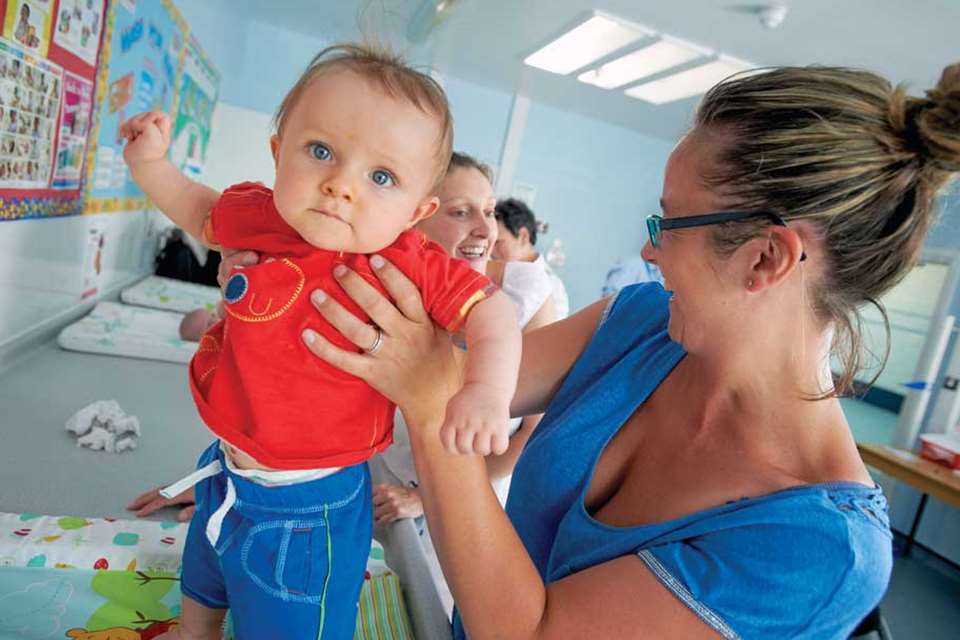Report paves way for Integrated Review for two-year-olds
Friday, November 21, 2014
The Government has published findings from the pilot phase of the Integrated Review for two-year-olds.

The report by the National Children's Bureau, on behalf of the Department of Health and the Department for Education, outlines the approaches to delivering Integrated Reviews taken by the five pilot sites, what methods worked and what didn't.
Since January 2012, five local authorities - Norfolk, Northamptonshire, Medway, Leeds and Islington, have been developing Integrated Review models, which they trialled for 12 months.
Five more local authorities were also identified as pilot partners to provide support.
'The Integrated Review at Age Two', due to come in by September 2015, is designed to bring together the Healthy Child Programme (HCP) health and development review, and the EYFS Progress Check currently used to assess children’s development at 24 to 36 months old and identify opportunities for early intervention.
By integrating the reviews, the Government believes parents will get a more complete picture of their child, drawing on the expertise of health visitors and early years practitioners.
Integrated review models
The report reveals that of the five pilot areas, three developed and tested approaches for children attending early years settings in children’s centres. In two of these areas early years and health practitioners worked together to deliver the review.
One pilot area developed, tested and rolled out reviews in private, voluntary and independent (PVI) settings. However, no attempt was made to facilitate joined-up working between early years and health professionals.
The fifth pilot site did not implement an Integrated Review but opted for an alternative approach. This involved an enhanced HCP health and development review delivered universally to all children by health visitors in children’s centres.
Most pilot sites held back from rolling out their Integrated Review models to childminders due to additional challenges associated with developing a practical model that would work for them.
While the report says that pilot sites worked hard to design, test and start to implement Integrated Review models across their local areas, the speed and extend of the roll-out varied across sites in terms of the scale of testing and the degree of focus on different groups of children.
Towards the end of the piloting period, two pilot areas had carried out fewer than 20 reviews; one had achieved more than 100 reviews, and the other two carried out around 100 reviews per month from April 2013.
The report also highlights how planning for implementation of the Integrated Review can be a 'time and resource intensive' process.
Local authorities reported that developing the design of the model in a way that would be fit for purpose and be practical on the ground was particularly time consuming, as was engaging and training early years and health staff, and establishing information sharing protcols, if not already in place.
According to the report, whereas local authorities and health services already tended to have existing relationships with children’s centres, a greater level of work was required to raise awareness and roll-out training and implementation among PVI settings.
Managers at one pilot site said it took 18 months to plan how to engage with ten pilot childcare settings to get them on board, and to begin delivering the Integrated Review.
Many local authorities felt that initial progress and planning was hampered by ‘a series of very slow meetings with DfE and DH’ over the course of 2012. They also felt there had been a lack of clear communication about some aspects.
Best practice
The report also outlines how best to deliver the Integrated Review.
Professional knowledge and an understanding of child development and clinical judgement were considered most important for successful delivery.
Having two lead individuals from health and early years working closely together was also considered beneficial.
The model that involved early years staff only did not always result in a fully accurate picture of need being achieved. The report says this is not surprising as early years practitioners were taking on entirely new professional aspects within their roles with very little training or experience in health issues.
Many local authorities said parental involvement was important and had a positive impact. Take-up of the reviews increased as a result.
The report concludes that it is too early to form judgements about whether or not the integrated approaches developed by the five pilot sites are more effective in achieving early identification of need than the current development reviews because the pilot was on a small scale.
In light of the findings, it goes on to recommend a set of key principles that need to be met by an integrated review, without being too prescriptive, be developed to support local areas in developing models for the future.
Sam Gyimah, childcare and education minister, said, ‘The early years count and this new approach will reassure parents they have the information they need to support their children when they are growing up to give them the best possible start in life.
‘This is a fantastic example of Government departments working together to improve the services on offer to parents.’
Health minister Dr Dan Poulter said, ‘This report shows that integrating health and early years reviews is better for children and their parents - giving a more complete picture of their child’s development and supporting children to the best start in life.’
The NCB has also published two further documents to help local authorities prepare for implementation of the Integrated Review.








